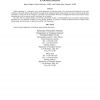Free Online Productivity Tools
i2Speak
i2Symbol
i2OCR
iTex2Img
iWeb2Print
iWeb2Shot
i2Type
iPdf2Split
iPdf2Merge
i2Bopomofo
i2Arabic
i2Style
i2Image
i2PDF
iLatex2Rtf
Sci2ools
128
click to vote
TASE
2010
IEEE
2010
IEEE
Sensor Placement for Triangulation-Based Localization
Robots operating in a workspace can localize themselves by querying nodes of a sensor-network deployed in the same workspace. This paper addresses the problem of computing the minimum number and placement of sensors so that the localization uncertainty at every point in the workspace is less than a given threshold. We focus on triangulation based state estimation where measurements from two sensors must be combined for an estimate. We show that the general problem for arbitrary uncertainty models is computationally hard, and present approximation algorithms for two geometric instances. For the general problem, we present a solution framework based on integer linear programming and demonstrate its practical feasibility with simulations.
Related Content
| Added | 21 May 2011 |
| Updated | 21 May 2011 |
| Type | Journal |
| Year | 2010 |
| Where | TASE |
| Authors | Onur Tekdas, Volkan Isler |
Comments (0)

